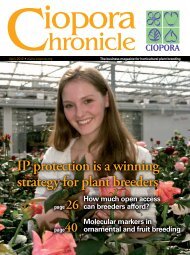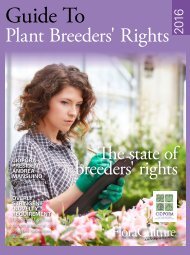2011 CIOPORA Chronicle - the 50th Anniversary Edition
CIOPORA annual magazine on Intellectual Property protection for plant innovations 2011. The magazine was produced in cooperation with FloraCulture International. Read in the 2011 CIOPORA Chronicle edition: - CIOPORA plays vital role in supporting the industry - PVR litigation on the rise - Plant Breeders´Right. Quo vadis? - China deploys national strategy for IPR - CIOPORA helps IP owners protect their rose varieties and much more...
CIOPORA annual magazine on Intellectual Property protection for plant innovations 2011. The magazine was produced in cooperation with FloraCulture International.
Read in the 2011 CIOPORA Chronicle edition:
- CIOPORA plays vital role in supporting the industry
- PVR litigation on the rise
- Plant Breeders´Right. Quo vadis?
- China deploys national strategy for IPR
- CIOPORA helps IP owners protect their rose varieties
and much more...
Create successful ePaper yourself
Turn your PDF publications into a flip-book with our unique Google optimized e-Paper software.
Patents<br />
<strong>the</strong>ir patent applications. This<br />
could have <strong>the</strong> effect of an immediate<br />
blockage of <strong>the</strong> development of<br />
competitive varieties.<br />
Since (roughly)<br />
<strong>the</strong> beginning of<br />
this century we<br />
have extended<br />
possibilities for<br />
patenting biotech<br />
inventions, which<br />
has lead to a<br />
substantial influx<br />
of patent rights in<br />
<strong>the</strong> world of plant<br />
breeding.<br />
Conclusions<br />
Solid ground<br />
We cannot deny that <strong>the</strong> patent<br />
system has gained solid ground in<br />
<strong>the</strong> world of plant breeding and is<br />
• Patents increasingly form an obstacle to plant breeding because <strong>the</strong>y can<br />
restrict access to germplasm;<br />
• This is not materially changed by restrictive interpretation of <strong>the</strong> Biotech<br />
Directive on issues like <strong>the</strong> requirement that genetic material performs its<br />
function, or <strong>the</strong> exclusion of essentially biological processes;<br />
• Amendment of existing laws is difficult;<br />
• We need o<strong>the</strong>r creative solutions, such as a broader application of compulsory<br />
licensing, to restore a productive and reasonable balance.<br />
here to stay. Patent laws provide<br />
for a balanced system for <strong>the</strong> enhancement<br />
of innovation and <strong>the</strong>y<br />
have a much longer history than<br />
PVP-based protection systems. In<br />
essence <strong>the</strong>re does not seem to be<br />
a sound systematic reason to allow<br />
for a special carve out from patents<br />
for <strong>the</strong> plant breeding industry.<br />
If, for example, <strong>the</strong> car industry<br />
came to <strong>the</strong> legislator with <strong>the</strong><br />
complaint that all <strong>the</strong>se patents for<br />
car components make it difficult to<br />
produce safer cars, this would not<br />
present a reason to create a special<br />
exemption for car manufacturers<br />
to make use of inventions that<br />
have a connection to safety in <strong>the</strong><br />
automotive industry. Therefore<br />
it will be not easy to think of a<br />
good reason for a kind of positive<br />
discrimination for breeding<br />
companies.<br />
Liberal rules<br />
The problem posed by patents will<br />
not be solved by amending <strong>the</strong><br />
legislation so as to include a limited<br />
exemption for breeding work,<br />
which has been done in France<br />
and Germany. Such a freedom for<br />
breeding purposes has little meaning<br />
when new varieties are to be<br />
introduced on <strong>the</strong> market.<br />
A more promising route to a<br />
solution might be offered by more<br />
liberal rules regarding compulsory<br />
licensing. So far, <strong>the</strong> requirement<br />
of significant technical progress<br />
of considerable economic interest<br />
has been applied very strictly.<br />
As a result <strong>the</strong>re are virtually no<br />
examples of breeding companies<br />
that have made successful attempts<br />
for obtaining compulsory licenses.<br />
If a patent appears to block <strong>the</strong><br />
development of new varieties on a<br />
large scale, a more liberal approach<br />
to compulsory licensing could<br />
present an effective and reasonable<br />
tool to remove <strong>the</strong> obstacle, without<br />
wiping out <strong>the</strong> reward factor of<br />
patents altoge<strong>the</strong>r.<br />
In my view this would be far easier<br />
than trying to bend <strong>the</strong> whole<br />
system, because this would take<br />
years - if at all successful. |||<br />
<strong>CIOPORA</strong> <strong>Chronicle</strong> April <strong>2011</strong> | www.<strong>CIOPORA</strong>.org 23









